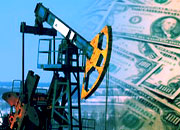"With the Russian state running its first budget deficit in a decade, there is no denying the importance of oil to the economy. But it is a myth to say that Russia is a petro-economy," is written today by the newspaper "The Telegraph".
Oil actually only accounts for about a fifth of Russia's gross domestic production, whereas services are far more important and now make up more than half of GDP.
Put another way, GDP per capita in 2008 was about $15,800, according to the CIA, whereas oil production accounted for only $3,912 of this total – and that is assuming oil was at the peak price of $150 for all of last year.
Where oil and gas do dominate is in both tax and export revenues where they make up for about two thirds of all the dollars Russia earns abroad. But the taxes earned from oil are high because the state uses them to subsidise the rest of the economy.
The state taxes away about 90 cents on every dollar an oil company earns from oil exports over a price of $27 a barrel, but at the same time Russia has some of the lowest income tax, corporate profit tax and VAT in Europe.
Russia is one of the few oil-producing countries in the world where the majority of oil production is in the hands of private companies. Taxing oil so heavily means that the ultimate beneficiary of Russia's oil wealth is (in theory) the Russian people, not the oligarchs who own the companies. More demonstrably, the high tax on oil allows low taxes on everything else which should bolster diversification.
Of course, it doesn't work quite so well in practice, which is highlighted by the other half of the equation: the dominance of oil and gas in the export revenue.
Taxes on real sector companies may be low but the value of the rouble is high, making exports uncompetitive in the international markets. The tide of petrodollars causes the so-called Dutch disease that inevitably drives up the value of the currency. The upshot is Russia's other exports – such as planes, power stations and caviar – cost more than they should.
To its credit, the Central Bank of Russia has worked hard to try to keep the value of the rouble down just as the price of oil soared 15-fold since 1998.
The state was enjoying a huge tax windfall from oil, but the frustrated Duma deputies were unable to touch any of the $600bn that was locked up by finance minister Alexei Kudrin in the stabilisation fund, up from a mere $9.1bn in 1998.
Kudrin's motive was to build up reserves in case there was another crisis, which turned out to be a good idea. But, even more importantly, the stabilisation fund "sterilised" the oil windfall money: as the windfall money can't be spent it doesn't push up either inflation or the value of the rouble.
Still, all this money sloshing about (Russian oil companies still make a packet from the part of the oil price not taxed below $27) kept inflation and appreciation high in recent years. So Russian industry is still struggling to make things that the rest of the world wants to buy.
And that is what all this talk of "modernisation" is about in Moscow. On November 12, Russian President Dmitry Medvedev gave his first state-of-the-nation speech, most of which was dedicated to how the state needs to modernise the Russian economy. Russia doesn't need money; its needs know-how, he argued.
It is an old theme and the Kremlin's record has not being good so far, distracted by crises, terrorists and battles with oligarchs. Finally, a serious start was made in 2007 after inflation fell to single figures for the first time in modern history and the state showcased a $1 trillion investment programme to rebuild Russia's dilapidated infrastructure.
But that plan, like most of the others, has been derailed by this crisis. While the Kremlin may hope for a return of $100 oil soon, what would be best for the country is cheap oil that will force the government to concentrate on the programme espoused by Mr Medvedev.
28 Февраля 2026 | суббота | 19:09


